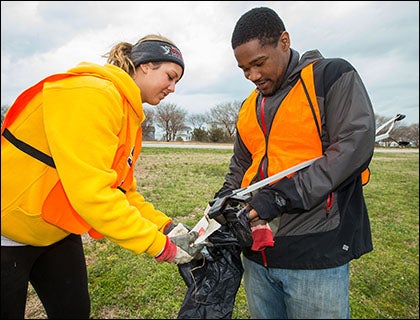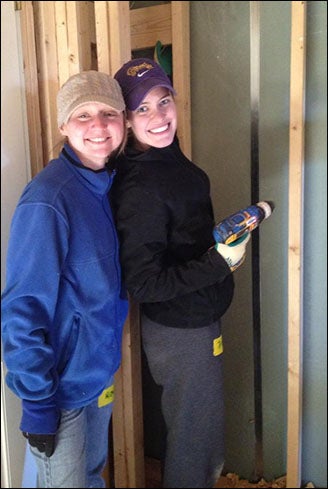BREAKING FOR SERVICE
ECU students impact environment, society during spring break
Boots, gloves and toboggans replaced shorts and T-shirts for a group of East Carolina University students over spring break.
Through a brisk wind and light rain on March 12, students picked up trash, tires and drift lumber in a Newport River marsh along U.S. 70 in Beaufort. The students signed up for Alternative Spring Break as a way to engage in meaningful service work through ECU’s Volunteer and Service-Learning Center.
Nine students collected bags and bags of garbage, discarded coolers and large pieces of wooden docks blown away during nor’easters or storms near the bridge leading from Morehead City to Beaufort. “This stretch of marsh, particularly with high tide, will become littered,” said Sam Bland ’80, a coastal specialist with the N.C. Coastal Federation. “We concentrate on keeping it clean. Where we can get in the marsh, we do. There’s just so much.”

ECU students Madison Welsh and Jordan Martin gather trash during a clean-up activity as part of alternative spring break.
Stefania Blevins, a senior psychology major and marching band member from Fayetteville, said she looked forward to telling friends and family about what she has learned about sustainability. The experience has inspired her to build a rain garden. “There are so many rivers we’re neglecting that we could do something for,” she said.
During the week, students planted trees, maintained gardens at elementary schools in Carteret and Onslow counties, helped build a Habitat for Humanity home and served food at the Hope Mission Soup Kitchen in Morehead City.
“It’s something I didn’t know much about so I wanted to broaden my knowledge about our community,” said Vera Okons, a sophomore pre-medicine student from Fayetteville.
“It’s been rewarding and humbling,” said Madison Welsh, a freshman communications major from Charlotte.
ECU’s VSLC offered two service trips including the one to Carteret County for students interested in environmental issues and learning about coastal communities. Another group went to Baltimore to learn about hunger and homelessness.
Each group lived on a $7 per day budget, an amount that could easily be spent on lunch in Greenville. The amount is on average a little more than what a food stamp recipient in North Carolina receives per day.
“Part of it is to immerse them in the experience,” said Shifra Sered, AmeriCorps VISTA coordinator for VSLC and a Carteret County trip leader. “It’s one thing to serve people, but to see how much forethought, planning and stress is involved with living on this type of budget is important.”
Holly Buickerood, a junior middle grades education major, said she traveled to Baltimore because she wanted to make a difference. “I have come to find that what people believe hunger and homelessness is by simply from the outside looking in is completely different than what it actually is,” she said. “Homelessness isn’t just for people who do drugs or are criminals. It can be anyone.”

Nichelle Shuck, left, associate director for student leadership and educational programs at VSLC and ECU student Holly Buickerood work on home construction tasks during alternative spring break.
The students volunteered in homeless shelters, soup kitchens, Habitat builds and other related organizations. They slept on the floor at Lovely Lane United Methodist Church, the first United Methodist church in the United States. “We were able to submerge ourselves into the community and attempt to see Baltimore through the eyes of someone who is homeless rather than just a tourist,” Buickerood said. “We saw the good, bad and ugly. However, what we saw was real.”
Students spent the week thinking critically about social issues and spent time with people who have been or are homeless, said Nichelle Shuck, associate director for student leadership and educational programs at VSLC.
Students were challenged to role-play the lives of low-income families, from single parents trying to care for their children to senior citizens on Social Security. The task was to provide food, shelter and other basic necessities during the simulation while considering all of life’s circumstances, Shuck said.
The students learned about different types of non-profits and approaches to service while visiting 10 different sites in the Baltimore area. Some of the students questioned how they could make a difference beyond the spring break experience and apply what they learned at home, Shuck said.
“We had very tough conversations with ourselves, each other, community leaders, and I believe that these students are going to keep searching for the answers,” Shuck said.
Students in Carteret County also discussed access to food and housing, community connections and environmental justice and how those things are related, said Meagan Smith, a VSLC staff member and trip leader. “We talked about what community means, and individual responsibility to community, tying into greater themes of social justice.”
Some students had visited Atlantic Beach on vacation, but hadn’t ventured much beyond the waves. “They are seeing a different side of the coastal region even if they’ve been here before,” Sered said. They worked closely with community partners and bunked at Camp Albemarle, a Presbyterian Church-affiliated summer camp in Newport.
Bland, who works in habitat restoration and environmental education for the N.C. Coastal Federation, said ECU students have been helping over spring break at least three years. “They really get involved and ask so many questions. And that makes it fun for staff. It really helps us out with our mission and the things we’re trying to do,” he said.
Students were encouraged to spend time each evening reflecting individually in journals and collectively as a group. Students have been developing a group photo essay titled “This we believe” and will meet March 25 to finalize their projects, Shuck said.
ECU has offered an alternative spring break since 2005 when students helped with Hurricane Katrina disaster relief. Trips also have been offered through campus ministries and campus living.
